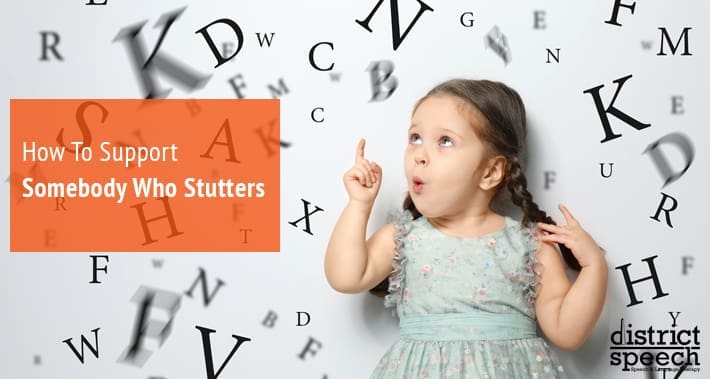
Do you know someone who stutters?
Have you heard of any of these famous people who’ve stuttered?
Maybe a friend, a loved one, or a colleague?
Or perhaps you’re just generally a conscientious person who wants to make things easier for the people around you.
You might even be looking for speech therapy for stuttering that you could recommend to them.
Stuttering is one of the most common speech disorders in the US, with about 3 million people who stutter.
It can affect both children and adults as well, which means that speech therapy for adults as well as pediatric speech therapy has a focus on it.
So, chances are you’re going to encounter somebody who stutters sooner or later.
Today we’ll take a look at what stuttering is, how you can help someone who has one, and what NOT to do.
What’s Happening When Somebody Stutters?
A stutter is a speech disorder that involves frequent and significant problems with the fluency and flow of speech.
Stuttering is considered a fluency disorder, an umbrella term that also includes cluttering disorders.
People who stutter know what they want to say but struggle to say it.
It can sound like the repetition of a word or sound over and over again.
But what causes stuttering in adults?
It’s currently understood that stuttering is a complex neurodevelopment disorder.
When a person stutters, it might seem like they’re hesitating because they don’t know what they’re saying, or they’re unsure of what to say.
But, this isn’t always true and stuttering isn’t caused by anxiety.
You can be sure that they’re checking their speech and they’re worried about how they say something.
They may also talk quickly.
People who stutter can often struggle to say their name.
If you’re about to meet new people, ask the person who stutters privately beforehand if they want to introduce themselves or if they’d like you to introduce them.
If you are in a group setting and everyone is talking, make sure you can see the person who stutters.
If you notice that they might want to say something but aren’t able to easily join the conversation, invite them to share their thoughts, even if it interrupts the flow of discussion.
Doing this shows them that their input is valued and may help them to feel more included.
How To Support Somebody Who Stutters
There are many ways to support someone who stutters.
Here are some tips to try.

1. Most Importantly, Be Patient
Give the person time to say what they want to say, even if you think you know what they’re going to say.
Patience is key, and it demonstrates that you’re still listening to them.
If you seem impatient, the person may find your response discouraging and think that you aren’t interested in talking to them.
Letting them know that you’re interested in hearing their contribution goes a long way to encouraging them to share their thoughts with you.
2. Recognize Their Triggers
Sometimes, stressful situations can make stuttering worse.
Situations where stutterers have to meet new people, deal with a different environment than usual, or have to speak on the phone can trigger a more intense bout of stuttering.
Knowing a person’s triggers means that you can offer to help them navigate more stressful environments.
If you know they are going to go into a potentially triggering situation, ask them what you can do to help, and let them know you’re there for them.
3. Avoid Making Obnoxious Jokes
Don’t joke about someone’s stutter or speech patterns like their intonation or their articulation.
It can also be rude if you’re pointedly asking them to repeat themselves in order to highlight their stutter to the group.
They might already feel nervous, embarrassed, or even ashamed of their speech condition, and joking about it just tells them that their negative feelings are warranted.
If you hear someone else making jokes about someone else’s stutter, speak up, challenge the joke, and explain why it’s inappropriate to joke about someone’s manner of speaking.
When you’re challenging a hurtful joke, be sure not to point out your friend or family member in a way that makes them uncomfortable.
It should be sufficient to say “I don’t see why someone’s speech pattern is funny and I don’t want to hear those kinds of jokes again.”
By showing up for your friend or family member in a meaningful way, they know that they can count on you for support with their stutter.
That said, your friend may joke about their stutter themselves.
That’s their decision to make, not yours.
4. Avoid Finishing Their Sentences
Although it can be tempting to finish your friend or family member’s sentences for them if they’re stuttering, you should avoid doing this.
Don’t interrupt or try to guess what they’re saying.
It can feel disempowering, especially when you get it wrong and they were actually trying to say something different.
At that point, the conversation moves away from their topic and toward you playing 20 questions – that’s no fun for anybody involved.
5. Ask Them How You Can Help
It’s also a good idea to ask the person you know who stutters if there’s anything in particular that you can do to help them.
Making sure that they know you’re there to support them is often the first step.
The list above is, of course, just a starting point.
Your friend or family member who stutters might have even more ideas that would help.
Book Your Appointment With District Speech Today
Remember, stuttering is a common communication deficit for adults.
It’s also common in children, where spotting the early signs of this speech disorder can make a world of difference.
Don’t believe the common myths that your child will definitely grow out of it, this isn’t always the case.
The best age to begin speech therapy is when you notice your child isn’t meeting their speech development milestones.
If you would like to know more about what is stuttering, how can a speech therapist help, and how you can help a friend or family member who stutters, our Washington DC speech pathologists can help.
We can give you actionable ideas and ways that you can support the speech goals of an important person who stutters in your life.
Book your appointment with District Speech today.
1300 I St NW, Suite 400 E,
Washington, DC 20005
- https://g.page/districtspeech
District Speech and Language Therapy specializes in speech therapy, physical therapy, and occupational therapy solutions, for both children and adults, in the Washington D.C and the Arlington Virginia areas.